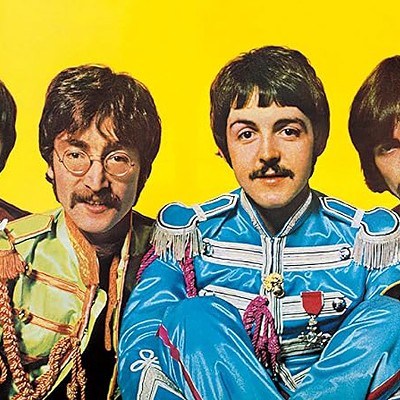A few weeks ago, a Facebook friend of mine posted a simple query: Tell me of some greatest-hits/singles comps that somehow became as (or more) essential as the artists' LPs. I chimed in, as did several dozen others. What resulted was a series of "why didn't I think of that?" moments, along with a handful of "how have I never heard of that?" shockers. It was an interesting exercise, and it got me feeling a bit self-reflexive about my own relationship with greatest hits albums.
For a long time I thought they were the lazy way out, even though I own a few. As I scrolled through the list that emerged on my friend's wall, offering my own examples as they popped into my head, I realized that I'd somehow formed an opinion that runs somewhat counter to my own habits.
As I mentally checked boxes, forced to think about why I own the comps I own, I settled on a set of rules for deciding whether or not a comp album is a worthwhile buy. Based on that rubric, here are a few albums suitable for the casual listener and obsessive fans alike.
For starters, the rules. In general, in order for a compilation to fit the bill, it has to do something not obtainable on an album, and do it well. Typically, this means either density or depth. The real decision is a multi-point, differentially weighted consideration that depends heavily on your own personal taste, but can be more or less distilled into three rules for consideration, as follows.
- Rule 1: If a compilation album contains the vast majority of songs worth listening to, effectively negating or greatly diminishing the value of owning individual albums, it's in.
- Rule 2: If a compilation album assembles a sufficient number of worthwhile rarities, representing an essential component of the band's catalogue, it's in.
- Rule 3: This one is a special rule, applying to multi-artist comps. Basically, if a compilation offers sufficient insight into a period/style/movement, it's in.
Certainly, these are sliding scales, with a strong YMMV caveat. I have little doubt that each of the following selections will be met with some disagreement. I also have little doubt that many have their own lists, none of which show up here. Let me have it in the comments, and please add your choices for must-have compilations.
BUZZCOCKS, Singles Going Steady Rule 1 AND Rule 2.
Aside from a truly unnecessary live set from Paris in the '90s, this is the only Buzzcocks slab I own, and the only one I've ever felt the need to own. Capturing the loose-limbed immediacy, deft humor, Velcro melodies and textbook sophomoric attitude of the band in 16 tracks, it's a thrill from start to finish, even counting a handful of stylistic outliers.
It's all angst and angles, charming and sneering in equal measure, delivered in (mostly) three-minute punches of pitch-perfect, poppy punk, much of which never appeared on a proper album. It will ruin you for everything else the Buzzcocks ever recorded.
The Vaselines: The Way of the Vaselines/Enter the Vaselines Rule 1 AND 2 (if you go in for Enter.)
Basically, this is the Vaselines' entire recorded output, reunion material notwithstanding. You could search around for rare individual recordings or just get the whole shebang here. Depending on how much of a completist you are, Way or Enter may prove the better purchase. I own both, but rarely listen to the second disc from Enter the Vaselines, which mostly cobbles together demos and live performances.
Given the already shambling, amateurish approach of the band's more formal efforts, the demos just don't catch for me as anything other than an interesting document. The first half, though, is a near-perfect statement on the why-not attitude. It's simple, slightly unhinged, and always stitched together by a series of dick jokes and half-remembered chords, but it's exceedingly atavistic listening.
Chuck Berry: The Great Twenty-Eight Rule 1, with a twist.
If you're new to Chuck Berry, I understand. Certain artists just sort of fall off the radar, despite their legendary stature. Enough time, enough branching influence, and most of the greats seem to fade into the shadow they cast. That said, its blend of approachability and breadth make The Great 28 the a perfect way to pull ol' Chuck out of the shadows.
Focused on Berry's early career, it's a ringing endorsement for the man's position as a godfather of rock and roll. It fairly oozes youthful exuberance, with an edge of rebellion that still hits high notes despite being a record of a culture six decades behind us. If Chuck is a firm fixture in your personal rock firmament, The Great Twenty-Eight still stands as a deeply pleasurable listen, showing him in top form at the edge of a musical moment, his feet reeling and rocking across the line that separated your parents' music from theirs. You'll buy it, you'll love it, and you'll want more. These Great 28 are just that.
Story continues on the next page.






